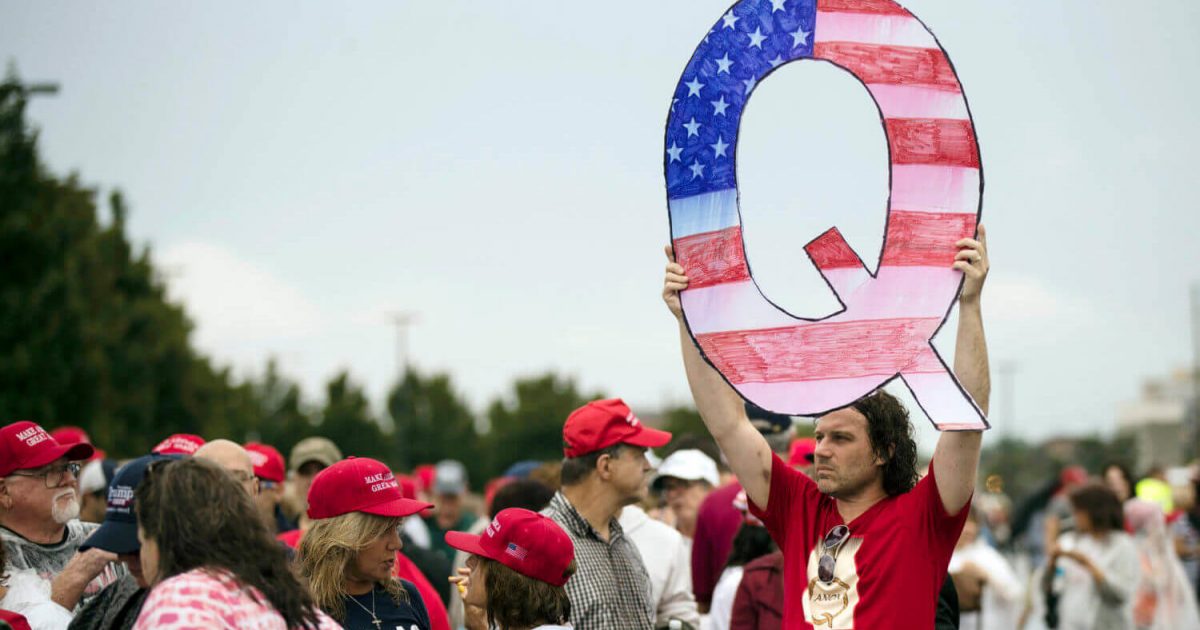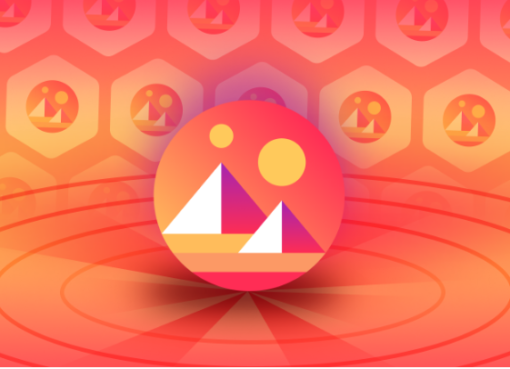- QAnon has gained heightened attention in the news lately after President Trump was asked about the extremist conspiracy group in a press conference.
- The QAnon conspiracy theory has been linked to numerous criminal and violent incidents in the past.
- The FBI previously cited QAnon as a domestic terror threat.
Oh, what a time to be alive.
Six months into the pandemic, the U.S. is still struggling to dampen the raging flames of COVID-19, a disease that has to date claimed the lives of more than 170,000 Americans.
We’re preparing for what is arguably one of the most contentious elections in our nation’s history. The economy is in shambles, with a national unemployment rate of 10.2%.
Until a few months ago, QAnon was a fringe conspiracy theory that few had heard about, much less given credence to. Now, it would seem that the movement has risen from its rightful place at the bottom of the internet barrel.
At its core, the movement propounds that our nation’s leader is a savior-like harbinger of truth, here to save us from an alleged deep-state cabal comprised of cannibalistic, blood-drinking Satan worshipers, pedophiles, and Hollywood elite.
Rather than immediately dismissing the group for the conspiracy theory it is—as Vice President Mike Pence did–President Trump responded:
I don’t know much about the movement, other than I understand they like me very much, which I appreciate.
He went on to say:
These are people that don’t like seeing what’s going on in places like Portland and places like Chicago and New York, other cities and states. And I’ve heard these are people that love our country and they just don’t like seeing it.
You can see the clip from the press briefing below.
It’s probable that President Trump doesn’t know much about QAnon. White House Press Secretary Kayleigh McEnany said she hadn’t heard the President ever discuss the movement.
The President’s failure to openly decry the conspiracy theory, not to mention his history of retweeting its followers, has caused alarm on both sides of the political aisle and only served to fan the flames of QAnon stalwarts.
Q’s Followers Are Rising Rapidly Amid the Pandemic
It’s unknown whether “Q” is one or multiple people. Many have surmised that “Q” could be a high-ranking intelligence officer or someone deeply ensconced in the upper echelons of our government.
Troublingly, the anonymous and ever-elusive “Q” has gained a considerably augmented following since the pandemic began.
Last week, Facebook said that it had removed nearly 800 QAnon groups from its platform. On Aug. 7, BBC reported that Facebook had deleted a massive QAnon group with almost 200,000 members.
The Guardian said on Aug. 11 that during a deep dive into QAnon, it had located over 4.5 million total followers of the fringe conspiracy theory on Instagram and Facebook. According to The Guardian, there are Facebook groups reserved for QAnon followers from at least 15 countries around the globe.
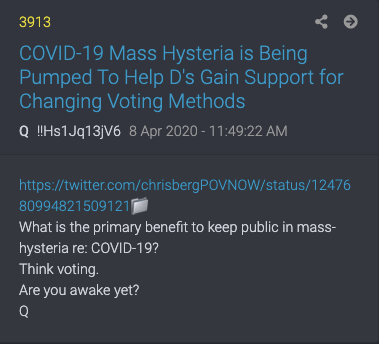
As if the U.S. wasn’t already having a tough enough time battling misinformation about the coronavirus and anti-maskers, QAnon ideologues added further fuel to the fire in propagating salacious misinformation about the pandemic.
They surmised at first that the coronavirus was a fraud created by the deep state as a means of preventing President Trump from winning the election in November. Later, QAnon proponents determined that the coronavirus and subsequent lockdown were part of the President’s alleged scheme to mask his real mission of taking down deep state cronies.
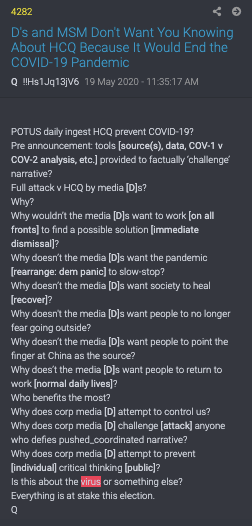
“Q” has also posted some choice tidbits over the past several months, labeling the pandemic as “mass hysteria” ploy to stop the re-election of the Trump, and pushing hydroxychloroquine as a cure for the virus.
A Homegrown Terror Threat?
A memo published by the FBI last year detailed the increasing danger that fringe political conspiracy theories pose to national security. The memo specifically named QAnon as one of a long list of conspiracy theories that could lead to incidents of domestic extremism and violence. One section of the memo notes:
The FBI assesses these conspiracy theories very likely will emerge, spread, and evolve in the modern information marketplace, occasionally driving both groups and individual extremists to carry out criminal or violent acts.
A report by Media Matters for America found that:
The QAnon conspiracy theory has been tied to multiple violent incidents and threats of violence, including a man accused of murdering his brother with a sword, a man accused of murdering an alleged crime boss, a man who reportedly threatened to kill YouTube employees, an armed man who blocked the Hoover Dam with an armored vehicle, and even a man who threatened to assassinate Trump, among numerous other incidents.
“Q’s” Influence Could Reach the Highest Seats of Power
In the days leading up to the primaries, an increasing number of GOP congressional candidates were reported to have shown support or otherwise been linked to QAnon is some shape or form.

While he may have done so unwittingly, President Trump has also amplified QAnon voices many times. Media Matters reports that:
As of August 20, 2020, President Donald Trump has amplified accounts promoting the QAnon conspiracy theory at least 216 times via at least 129 individual accounts, some of them more than once.
One of the most notable past proponents of QAnon rhetoric was Georgia Republican Congressional candidate Marjorie Taylor Greene. Greene has since separated herself from the movement. In an interview with Fox News, she stated,
I was just one of those people, just like millions of other Americans, that just started looking at other information. And so, yeah, there was a time there for a while that I had read about Q, posted about it, talked about it, which is some of these videos you’ve seen come out. But once I started finding misinformation, I decided that I would choose another path.
A growing number of Republicans have also censured QAnon following President Trump’s press conference.
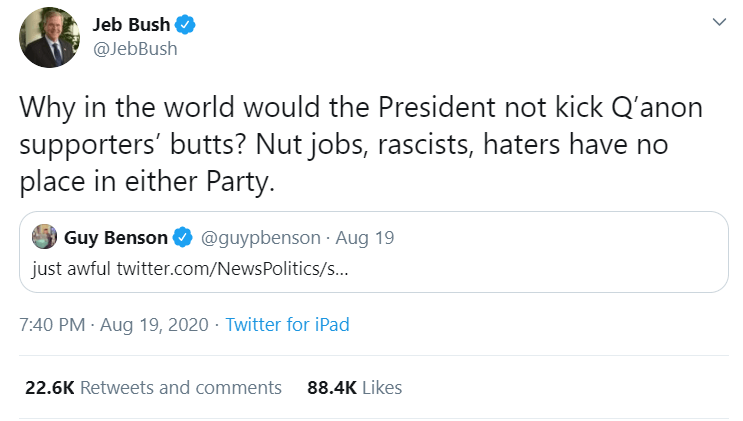
Sadly though, the buck doesn’t stop there.
Is There a Real Threat?
I know what you might be thinking.
Just how dangerous is QAnon? Aren’t these just some unorthodox folks on the periphery of the Republican Party, the kind that almost every political faction must contend with?
If only the answer were that simple.
The U.S. has dealt with its fair share of security threats before. But, the risk of dangerous, inflammatory misinformation, such as the kind propagated by QAnon, must be met with a different sort of combat strategy.
In the digital age, the spread of misinformation can be one of the greatest threats of all.
If QAnon’s claims were valid, it would mean that at its core, the government was a front for twisted, sick rituals and practices, so vile that it should shake our country to its very core.
The fact that the FBI has labeled extremist groups like QAnon a potential domestic terror threat signifies that this isn’t your average tin foil hat friend spinning yarns about the end times. A look at incidents like Pizzagate reveals how thin the line is between these types of beliefs and a situation where innocent people are being threatened, terrorized, and endangered.
Until the administration draws a distinctive line in the sand to fully separate itself from and censure the far-right conspiracy theory, this fringe minority could very well keep growing.
Our country is fractured and fraught with pain right now. The devastating impact of the pandemic has left people looking for answers—and it would seem that millions are now looking to “Q.”
Disclaimer: The opinions expressed in this article do not necessarily reflect the views of CCN.com.

